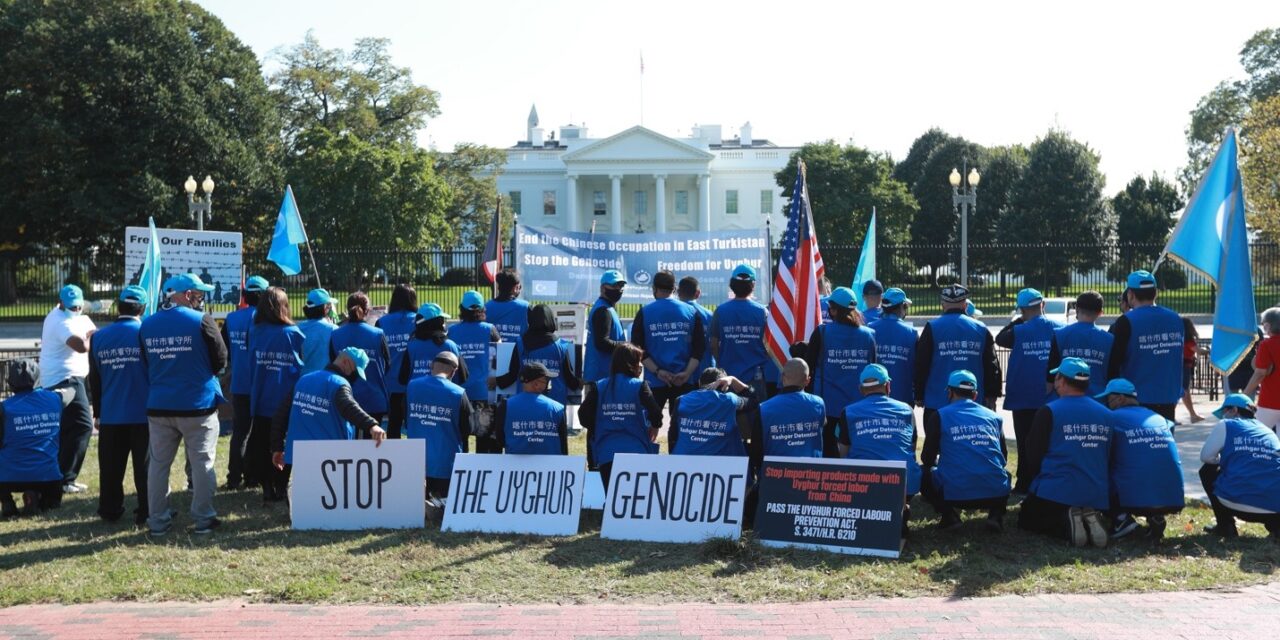Following allegations of genocide against the People’s Republic of China, the Uyghur Tribunal was formed in 2020 to hear and investigate available evidence pointing to China’s guilt. What is the purpose of this Tribunal, and why is it deemed important?
In the past two years, the world has been preoccupied with the complexities ushered in by the Covid-19 pandemic. What many did not know, however, is the fact that a few years before the emergence of the pandemic in Wuhan, China, trouble of another kind had already been brewing some 2700 kilometers away from Wuhan in the autonomous region of Xinjiang in China, the home of the Uyghurs.
The Uyghurs (or Uighurs) are Turkic-speaking Muslims predominantly resident in a North-Western region of China officially called the Xinjiang Uyghur Autonomous Region (XUAR).[1] Ethnically and culturally, they are much more similar to the Central-Asian nations than the Chinese. The Uyghurs are about 12 million in number.[2]
Amidst other claims, there have been allegations that since 2014 the Uyghurs have been forced into “re-education” camps, abused, tortured, and killed by the Chinese authorities.[3] In essence, China has been accused of committing genocide against this group. Satellite images also show that China has been building these detention camps in Xinjiang.[4] States such as the United States, Australia, the Netherlands, and the United Kingdom have spoken out against the alleged genocide. According to Anthony Blinken, the US secretary of state, “China is committing genocide and crimes against humanity.”[5] In addition, Human rights NGOs such as Amnesty International and Human Rights Watch have published reports concerning China’s genocide activities against the Uyghurs.[6] Beijing maintains a definitive stance and continues to deny reports of any such human rights infringements. According to Zhang Jun, China’s UN Ambassador;
“To the US and a few other countries, let me say this: Your trite lies are totally unfounded…Xinjiang enjoys stability, development, and prosperity, and the Chinese people’s life is getting better day by day.”[7]
Generally, genocide is punishable under the Rome Statute.[8] However, the International Criminal Court has not acted on the evidence presented to it by the legal representatives of the Uyghurs because China is not a signatory to the statute.[9]Uyghur representatives have also urged the ICC to assume jurisdiction based on evidence that some of the acts committed by China occurred on Tajikistani soil.[10] So far, the ICC has failed to act.
In order to hear and determine the allegations and evidence of genocide against China, the Uyghur Tribunal was formed in September 2020 with the help of the Coalition for Genocide Response. Sitting in the United Kingdom, the Tribunal acts independently and is not affiliated with or sponsored by any government or statute. It is constituted by an eight-man panel and chaired by a former prosecutor at the International Criminal Tribunal for the former Yugoslavia, Sir Geoffrey Nice QC. The Tribunal is expected to reach a verdict in December 2021. As clarified by its website;
“The Uyghur Tribunal, which has no powers of sanction or enforcement, will confine itself to reviewing evidence to reach an impartial and considered judgment on whether international crimes are proved to have been committed by the PRC…It will be for states, international institutions, commercial companies, art, medical and educational establishments, and individuals to determine how to apply the Tribunal’s Judgment, whatever it may be, in their dealings with the PRC…This could include, but is not limited to, trade and other sanctions including against individuals, proscribing the sale of technologies, surveillance and medical equipment and the declaration of ineligibility for visas.”[11]
It is clear that the Uyghur Tribunal has no jurisdiction over the People’s Republic of China or any other State for that matter. What then is the purpose of the Tribunal?
Though the Tribunal has no powers whatsoever to impose any sanctions on the People’s Republic of China, it has given the Uyghurs a platform to be heard. These alleged violations have been ongoing since 2014, and prior to the formation of the Tribunal, they have been swept under the carpet. Since June 2021, however, a host of witnesses have come to give evidence before the Tribunal. Their testimonies include detailed accounts of the atrocious activities allegedly being carried out in these detention camps. According to a female witness, “I have no words to describe the inhuman cruelty of the violence, I was raped by three of them together. I remember it very clearly. I cannot cry, and I cannot die; I must see them pay for this. I am already a walking corpse; my soul and heart are dead.”[12] Witnesses have also testified that the Chinese authorities have been taking steps to harass, threaten and intimidate witnesses. According to another witness, the Chinese authorities are “issuing international arrest warrants and launching judicial proceedings against Uyghurs in exile who could potentially speak out about their experiences, and by threatening their families and other loved ones in China.”[13]
As earlier noted, a final decision is expected to be reached in December 2021. Proceedings are public and even available via streaming platforms such as YouTube. Though no sanctions can be imposed on China, a guilty verdict will undoubtedly get the world to pay closer attention and could force the hand of the Chinese authorities to refrain from the alleged atrocities. The Uyghur Tribunal is, no doubt, a win for Human Rights.
[1] BBC News, ‘Who Are the Uyghurs and Why Is China Being Accused of Genocide?’ (BBC News, 21 June 2021) https://www.bbc.com/news/world-asia-china-22278037 accessed 5 November 2021
[2] Ibid
[3] Ibid
[4] Nathan Ruser, ‘There is Now More Evidence Than Ever That China is Imprisoning Uighurs’ (The Guardian, 24 September 2020) https://www.theguardian.com/commentisfree/2020/sep/24/china-imprisoning-uighurs-satellite-images-xinjiang accessed 6 November 2021
[5] BBC News, ‘Who Are the Uyghurs and Why Is China Being Accused of Genocide?’ (BBC News, 21 June 2021) https://www.bbc.com/news/world-asia-china-22278037 accessed 5 November 2021
[6] Margaret Besheer, ‘Growing Numbers of Nations Criticize China’s Treatment of Uyghurs’ (VOA News, 21 October 2021) https://www.voanews.com/a/growing-numbers-of-nations-criticize-china-s-treatment-of-uyghurs-/6281070.html accessed 6 November 2021
[7] Ibid
[8] UN General Assembly, Rome Statute of the International Criminal Court (last amended 2010), 17 July 1998, Article 6
[9] France 24, ‘ICC Rejects Uighur Genocide Complaint Against China’ (France 24, 14 December 2020) https://www.france24.com/en/live-news/20201214-icc-rejects-uighur-genocide-complaint-against-china accessed 6 November 2021
[10] Reuters, ‘Lawyers Urge ICC to Probe Alleged Forced Deportations of Uyghurs from Tajikistan’ (Reuters, 10 June 2021) https://www.reuters.com/world/asia-pacific/lawyers-urge-icc-probe-alleged-forced-deportations-uyghurs-tajikistan-2021-06-10/ accessed 6 November 2021
[11]Uyghur Tribunal, ‘about’ https://uyghurtribunal.com/about/ accessed 6 November 2021
[12] David Stavrou, ‘Witness after Witness, Hundreds Reveal the Atrocities of China’s Concentration Camps’ (Uyghur Tribunal News, 8 October 2021) https://uyghurtribunal.com/news/witness-after-witness-hundreds-reveal-the-atrocities-of-chinas-concentration-camps/ accessed 6 November 2021
[13] Ibid







